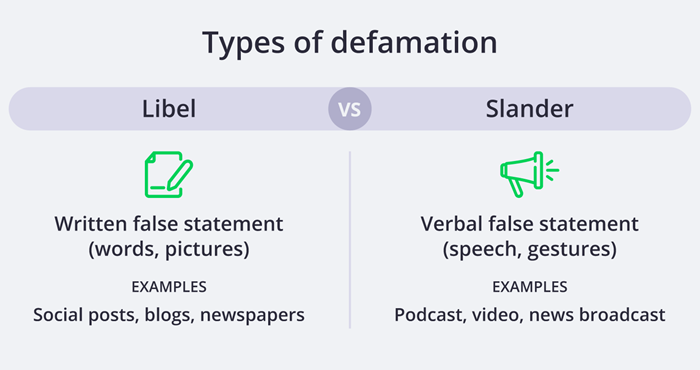Understanding the differences between slander and defamation can be confusing. Yet, they are essential terms in protecting one’s personal or professional reputation from false statements.
This blog offers an easy-to-understand breakdown of what constitutes defamation, slander, and libel.
Key Takeaways
- Defamation is the act of making false statements that harm a person’s reputation, character, or professional standing.
- Slander refers to false spoken statements that damage someone’s character or professional standing.
- Libel refers to false written or printed statements that also harm a person’s reputation.
- Seeking legal assistance is important if you believe you have been a victim of slander or defamation.
Understanding Defamation
Defamation is the act of making false statements that harm a person’s reputation, character, or professional standing.

Definition of defamation
Defamation refers to a false statement presented as fact that causes injury or harm to someone’s reputation. It typically happens when an individual intentionally spreads misinformation about another person, which leads to unjust damages to their social standing, character, or professional reputation.
The third party must believe the harmful statement for it to be considered defamation. This damaging act can take two forms: “libel,” referring to written defamation, and “slander,” addressing spoken defamation.
Elements of defamation
Defamation occurs when someone makes a false and defamatory statement about another person, causing harm to their reputation, character, or professional standing. There are three key elements that must be present for a statement to be considered defamatory.
Firstly, the statement must be false; it cannot be based on truth. Secondly, the statement must harm the individual’s reputation in some way. Lastly, the statement must have been communicated to at least one other person through publication or spoken words.
These elements together form the basis of a defamation claim and can lead to legal consequences for the person responsible for making false and damaging statements.
In order to successfully prove defamation of character in court, it is necessary to establish these elements by presenting evidence that supports each requirement. The burden of proof lies with the plaintiff who has been harmed by defamation, and they must demonstrate that all three elements are present in order to obtain compensation for any damage caused.
Difference between opinion and defamation
Opinion and defamation are two distinct concepts that often get confused. Understanding the difference between the two is crucial in order to avoid legal complications. An opinion is a personal belief or judgment, while defamation involves making false statements about someone with the intention of harming their reputation.
Unlike opinions, defamatory statements are presented as facts and can cause significant damage to a person’s character and professional standing if they are untrue. It is important to remember that expressing an opinion is generally protected under freedom of speech, whereas making false and harmful statements falls into the category of defamation, which is illegal and can lead to legal consequences.

Differentiating Slander and Libel
Slander is a false and defamatory statement made orally, while libel refers to a false and defamatory statement made in writing or through other permanent forms.
Definition of slander
Slander refers to the spoken form of defamation, where a false statement is made that harms someone’s reputation, character, or professional standing. It involves spreading untrue information about another person orally, potentially causing damage to their reputation and social standing.
Unlike libel (the written form of defamation), slander takes place through verbal communication such as conversations or speeches in public settings. Slanderous statements can include false accusations, character assassinations, or harmful rumours intentionally spread to cause unjustifiable harm.
Definition of libel
Libel refers to a false statement that is made in writing, such as through an article, blog post, or social media post. This written statement is considered defamatory when it harms someone’s reputation, character, or professional standing.
Unlike slander (which is the oral form of defamation), libel involves communicating false and damaging information through written words that are published for others to see. It is important to note that for a statement to be considered libellous, it must be untrue and cause harm to the individual’s reputation or character.
Libel can have serious consequences for both individuals and businesses alike if they are falsely accused or their reputations are unjustifiably harmed by harmful rumours or false accusations.
Key differences between slander and libel
| Slander | Libel | |
|---|---|---|
| Definition | False spoken statements damaging someone’s reputation. | False written or printed statements harming a person’s character or standing. |
| Medium | Oral | Written |
| Legal Implication | Defamation through spoken words. | Defamation through written or printed format. |
Consequences of Defamation
When a person is found guilty of defamation, they may face potential damages and legal consequences. Seeking legal assistance can help protect your rights and reputation. Read on to learn more about the serious repercussions of defamation.
Potential damages for defamation
If you engage in defamation, whether through slander or libel, you may face potential damages. These damages are intended to compensate the victim for harm done to their reputation, character, and professional standing.
The amount of damages awarded can vary depending on factors such as the severity of the false statements made, the extent of publication or dissemination of those statements, and any proof of actual harm that occurred as a result.
It’s important to understand that making false accusations with malicious intent can lead to significant consequences and legal repercussions. Seeking legal assistance is crucial if you find yourself facing a defamation claim.
Defences against defamation claims
Defences against defamation claims include truth, privilege, and opinion. If a statement is true, it cannot be considered defamatory. Privilege refers to situations where certain individuals have the right to make statements without fear of being sued for defamation, such as in court proceedings or legislative debates.
Opinion is another defense, as it is generally protected under the First Amendment. However, if an opinion includes false statements presented as facts or implies undisclosed defamatory facts, it may not be protected.
It’s important to consult with a lawyer who specializes in defamation law to understand all available defences and navigate legal proceedings effectively.
Seeking legal assistance
If you find yourself in a situation where you have been defamed or slandered, it may be necessary to seek legal assistance. A lawyer can help navigate the complex legal process and provide guidance on how to handle your case effectively.
They will assess the evidence, gather witnesses if necessary, and build a strong argument to prove defamation of character. By seeking legal assistance, you can protect your reputation, seek damages for any harm caused, and hold those responsible accountable for their actions.
Conclusion
In conclusion, understanding the difference between slander and defamation is crucial in protecting one’s reputation. Slander refers to false oral statements that harm someone’s character or professional standing, while defamation encompasses both written and oral false statements.
Regardless of the form it takes, defamation can have serious consequences and may result in legal action. It is important to seek legal assistance if you believe you have been a victim of slander or defamation to ensure your rights are protected.
Frequently Asked Questions
1. What is the difference between slander and defamation?
Defamation relates to any statement, oral or written, that damages a person’s reputation. Slander specifically refers to an oral statement causing such damage.
2. Could verbal attacks be grounds for defamation?
Yes, if someone makes a false verbal attack on your reputation, it could constitute as slander and thereby fall under the broader category of defamation.
3. How does libel differ from slander?
Libel involves harmful statements in fixed mediums like print or images while slander pertains only to spoken harmful and false statements
4. Can both libel and slander cause significant reputation damage?
Absolutely! Whether written (libel) or spoken (slander), these false assertions can inflict serious harm on one’s personal or professional reputation.




